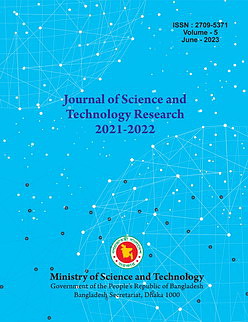Development of Multi-Walled Carbon Nanotube-Integrated Recycled Polyethylene Terephthalate Electrospun Antibacterial Face Mask
DOI:
https://doi.org/10.3329/jscitr.v5i1.74005Keywords:
MWCNTs, r-PET, Electrospinning, Face Mask, Covid-19Abstract
In this study, electrospun nanofiber membranes were successfully fabricated by modifying recycled polyethylene terephthalate (r-PET) with multi-walled carbon nanotubes (MWCNTs) for face mask applications. The recycling of PET bottles ensures effective waste management, while the electrospinning process facilitates the creation of delicate nano-range fibers. The inclusion of MWCNTs aimed to assess the antibacterial activity of the resulting nanomembranes. The fabricated samples underwent comprehensive characterization, including scanning electron microscopy (SEM), ultimate tensile testing, particulate filtration efficiency (PFE) testing, Fourier transform infrared spectroscopy (FTIR), and antibacterial sensitivity assays, revealing significant findings. MWCNTs incorporation led to minor bead formation in the membranes, with fiber diameters ranging from 446 to 862 nm. However, MWCNTs resulted in reduced stiffness and tensile properties due to the disruption of polymer chain alignment. The nanofiber membranes demonstrated effective filtration of 0.3 µm particulates, achieving filtration rates between 96 to 97%Functional group analysis confirmed the presence of both r-PET and MWCNTs in the composites. Although the r-PET/MWCNTs 12 kV membrane lacked an antibacterial zone of inhibition, it exhibited reductions of 28.64% for S. aureus and 31.9% for E. coli. These results collectively underscore the potential of r-PET/MWCNTs samples as an alternative nanofibrous membrane material for face masks.
J. of Sci. and Tech. Res. 5(1): 63-74, 2023
304
341
Downloads
Published
How to Cite
Issue
Section
License
Copyright (c) 2023 Md Enamul Hoque, Mirajul Alam Sarker, Md Rubel Alam, Md Abdul Gafur

This work is licensed under a Creative Commons Attribution 4.0 International License.




